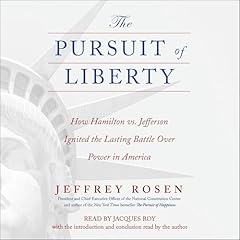
No Property in Man
Slavery and Antislavery at the Nation’s Founding
No se pudo agregar al carrito
Add to Cart failed.
Error al Agregar a Lista de Deseos.
Error al eliminar de la lista de deseos.
Error al añadir a tu biblioteca
Error al seguir el podcast
Error al dejar de seguir el podcast
Obtén 3 meses por US$0.99 al mes
 Exclusivo para miembros Prime: ¿Nuevo en Audible? Obtén 2 audiolibros gratis con tu prueba.
Exclusivo para miembros Prime: ¿Nuevo en Audible? Obtén 2 audiolibros gratis con tu prueba.
Compra ahora por $20.78
-
Narrado por:
-
L.J. Ganser
-
De:
-
Sean Wilentz
Americans revere the Constitution even as they argue fiercely over its original toleration of slavery. Some historians have charged that slaveholders actually enshrined human bondage at the nation's founding.
The acclaimed political historian Sean Wilentz shares the dismay but sees the Constitution and slavery differently. Although the proslavery side won important concessions, he asserts, antislavery impulses also influenced the framers' work. Far from covering up a crime against humanity, the Constitution restricted slavery's legitimacy under the new national government. In time, that limitation would open the way for the creation of an antislavery politics that led to Southern secession, the Civil War, and Emancipation.
Wilentz's controversial and timely reconsideration upends orthodox views of the Constitution. He describes the document as a tortured paradox that abided slavery without legitimizing it. This paradox lay behind the great political battles that fractured the nation over the next 70 years. As Southern Fire-eaters invented a proslavery version of the Constitution, antislavery advocates, including Abraham Lincoln and Frederick Douglass, proclaimed antislavery versions based on the framers' refusal to validate what they called "property in man."
©2018 Sean Wilentz (P)2018 TantorLos oyentes también disfrutaron:




















Las personas que vieron esto también vieron:

An interesting investigation of slavery's role
Se ha producido un error. Vuelve a intentarlo dentro de unos minutos.
Excellent!
Se ha producido un error. Vuelve a intentarlo dentro de unos minutos.
Vitally Important
Se ha producido un error. Vuelve a intentarlo dentro de unos minutos.
Mr. Wilenz deals with the issue with objectivity and avoids the present day’s political correctness, when evaluating how the slavery issue was debated and reflected in that times legislation.
Both books are illuminating and importmant contributors towards understanding the terrible injustice of slavery. Both authors share a liberal view in present day politics but Mr. Wilenz is capable of objectivity in his examination.
Observes today must understand the importance of evaluating the the horrors of slavery without looking at it through a prism imposing today’s values. Mr. Wilenz is capable of doing so.
Slavery is a horrible part of the World’s and America’s history. It is very easy to be critical of how slavery, which was introduced into America by the continents colonizers, was handled in the Constitution by the founding fathers. However, any such criticism should be considered with an understanding of the realities of the time. In no way does this justify what was done to the slaves, but it hopefully avoids the temptation to disregard any historical person who was associated with the despicable institution of slavery.
Excellent review of Slavery and the Constitution
Se ha producido un error. Vuelve a intentarlo dentro de unos minutos.


